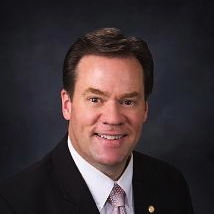(UPDATED, 11:08 a.m. Friday, to correct number of members on SBAC advisory committee.)
On Wednesday afternoon, Tom Luna and two of his aides were on the receiving end of some pointed questions.
They were grilled in a Senate Education Committee meeting over the state’s plans to field-test exams tied to the new Common Core standards.

And while Luna announced this week that he is not seeking re-election — in hopes, he said, of taking some politics from the education debate — the committee meeting was not without some political fireworks:
- While Luna’s staff has played an active role in the multistate group drafting the Common Core assessment, Meridian Republican and gubernatorial candidate Sen. Russ Fulcher said the test would undermine state sovereignty. “We have no control over this test. We have no control over this test content. … This is part of an agenda that is bent toward centralization and uniformity.”
- Sen. Steven Thayn, an Emmett Republican considering a run to succeed Luna, said little until the final minutes of the two-hour committee meeting. But Thayn, who has urged Idaho to drop the Common Core test, told Luna he had a list of 16 questions about the assessment. He then honed in on one facet he called disturbing: essay questions that will prompt students to argue one side of an issue. “I call that guided thinking. … I don’t like students or myself to be limited.”
The test in question is the Smarter Balanced Assessment Consortium exam, a 6- to 7 ½-hour computer exam. The state will field-test the exam this spring — but the results won’t be used to grade schools on the state’s five-star rating system. The test will count, for schools and students alike, in the spring of 2015.
Last spring, 124 schools piloted the SBAC.
“There’s a very deliberate reason that this is a three-year phase-in of the assessment,” Luna told the committee.
The field test will answer some of the nagging questions about the SBAC exam — including the time it takes for students to finish the exam.
Meanwhile, the State Department of Education will put together a 15-person advisory committee to figure out what the state needs to learn from the field test, and how to proceed in 2015 and beyond. The committee will include six principals, six superintendents and three testing coordinators; invitations went out Wednesday, Luna chief of staff Luci Willits told the committee.

But Idaho Falls Republican Sen. Dean Mortimer wondered aloud about ditching the new exam and going back to its old Idaho Standards Achievement Test. He and Committee Chairman John Goedde asked how much it would cost to go back to the ISAT.
Luna said the state has a clear idea of how much it would cost to stay in the multistate SBAC consortium; the state is spending about $1.7 million on this spring’s field test, with about two-thirds of the money coming from the federal government. Moving back to the ISAT could double the state’s costs.
And price is just one concern, Luna said. The ISAT would not be tied to the new Idaho Core Standards in math and English language arts. If the state tries to hold teachers accountable, based on a test that has nothing to do with academic standards, the state could open itself up to a lawsuit.
The committee took no action Wednesday. Goedde said the committee may hold another hearing later in the session to drill down on assessment issues.
